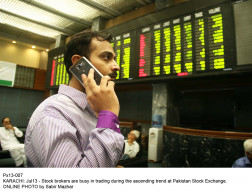
To be fair, the term is a relatively new one to enter the Pakistani vernacular and a satisfactory definition for ‘development consultancy’ is yet to be devised. The ‘for-profit’ nature of the consultancy is particularly bewildering. After all, the development kind is traditionally associated with fiery words and empty pockets.
Instead, many young crusaders are now finding themselves in large, tastefully decorated offices. Dreaming of drudgery, they wonder whether they will still be able to justify the self-righteous rhetoric. Can it be ethical to make money while trying to save the world?
To reconcile the paradoxes of this job choice, it is important to set the context. The development sector has come into its own over the past few years, adopting an ever stronger role in the politics, economics and social consciousness of Pakistan.
While it was originally designed to fill the vacuum that was the state development budget, a variety of factors have come together to make it an industry in itself. Among these are the succession of political and humanitarian crises that have smitten the country – and a massive influx of international aid.
This has changed the picture in such a way that ‘passion’ is no longer the primary means of sustenance for the would-be philanthropist. The plethora of reputable non-governmental organisations (NGOs) and advocacy groups are gaining increasing leverage as lobbying agents, because of access to foreign funds.
The government, crippled by lack of public confidence, is finding it useful to forge partnerships with civil society and the private sector.
Risk of becoming unwieldy
In this burgeoning development industry that is in danger of becoming unwieldy, consultancies act as small, powerful managing agents. They are employed by larger local or international organisations to provide inventive solutions to bottlenecks, often helping to form linkages and create synergies between relevant partners.
There is no succinct definition of a consultancy, simply because each has its own mandate and area of expertise in which it offers technical advice. This could be in fields as diverse as agriculture, enterprise development, environmental sustainability or female empowerment.
International organisations are often looking for help in identifying local agents for outsourcing projects – organic bodies like the Pakistan Poverty Alleviation Fund (PPAF) might be looking for tailor-made solutions for problems in implementing specific projects. Essentially (and ideally), then, such a consultancy is a for-profit firm working behind the scenes to construct the basis for development.
Perhaps because of a natural suspicion of middle-men, traditional non-profit NGOs are cautious in their treatment of the development consultancy. It may be because those conducting direct interventions – building schools and hospitals and offering microcredit from their own resources – do not entirely trust those whose work yields less tangible results.
In addition, even if they must compete aggressively for access to funds to survive and expand, their money must be shown to have been utilised in project implementation. Whether or not this happens is a different debate.
Capacity-building organisations
Capacity-building consultancies, on the other hand, are exasperated by the cut-and-dried methods and moral high ground of those directly dispensing help. They pride themselves on creating the foundations for a society that will help itself, as opposed to creating a relationship of dependence between different societal strata. According to them, the NGO is like a foreign invader seeking personal gains that cannot withdraw after an intervention. In contrast, capacity-building organisations work to design a framework in which development interventions can be conducted more effectively, but are content to leave after setting things in motion.
Either way, it is important not to be hasty in pronouncing judgement on everything for-profit. It is possible to be a business with a conscience, embodying the flexibility and creativity of private enterprise while still being in touch with ‘what winter means’. It is a channel through which to work with state programmes and NGOs, without being part of a system one cannot change.
As long as she does not get too comfortable and begin relying on rhetoric alone, the development consultant may hope to contribute something meaningful to a larger process of socio-economic transformation.
The writer is a development consultant
Pubished in The Express Tribune, October 4th, 2010.



1731655243-0/BeFunky-collage-(61)1731655243-0-165x106.webp)













COMMENTS (5)
Comments are moderated and generally will be posted if they are on-topic and not abusive.
For more information, please see our Comments FAQ